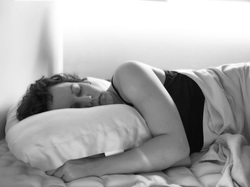Snoring
|
Causes
Snoring is commonly caused by a narrowing of the airway during sleep. When we sleep the muscles of the neck relax which can result in vibrations of the soft tissues causing the noise we know as snoring. Whilst snoring can be very annoying for those around you and can also disturb your own sleep, usually the causes are beyond your control. Factors that contribute to snoring include:
|
|
Effects
Snoring often causes sleep distribution both for the snorer and for their partner. It can be embarrassing and cause relationship problems as well as having a detrimental impact on their quality of life. Snoring can also be associated with medical complications and in some cases, if left un-treated, can give rise to the development of sleep apnoea. Click here to find out more about snoring.
More information can be found on the NHS website https://www.nhs.uk/ and search for "snoring"
Snoring often causes sleep distribution both for the snorer and for their partner. It can be embarrassing and cause relationship problems as well as having a detrimental impact on their quality of life. Snoring can also be associated with medical complications and in some cases, if left un-treated, can give rise to the development of sleep apnoea. Click here to find out more about snoring.
More information can be found on the NHS website https://www.nhs.uk/ and search for "snoring"
Sleep Apnoea

Obstructive sleep apnoea or OSA is a serious medical condition that is becoming more and more common in the UK.
Obstructive sleep apnoea is when a person stops breathing during sleep which may happen up to 60 times per hour. OSA is caused by the narrowing of the airway during sleep to the point where it becomes completely closed. OSA is associated with snoring however where snoring is caused by the narrowing of the airway, OSA is caused by the complete closure of the airway.
When the airway closes, breathing stops resulting in a lowered blood oxygen level, the brains response to this is to release adrenaline which in turn results in a partial awaking of the individual. They may not be aware of this awakening however it will certainly have a profound effect on their lives. A number of OSA sufferers experience excessive daytime sleepiness causing an inability to concentrate and marital disharmony. Sufferers also find themselves falling asleep at inconvenient times when they don’t wish to be asleep.
Click here to find out more about OSA.
Obstructive sleep apnoea is when a person stops breathing during sleep which may happen up to 60 times per hour. OSA is caused by the narrowing of the airway during sleep to the point where it becomes completely closed. OSA is associated with snoring however where snoring is caused by the narrowing of the airway, OSA is caused by the complete closure of the airway.
When the airway closes, breathing stops resulting in a lowered blood oxygen level, the brains response to this is to release adrenaline which in turn results in a partial awaking of the individual. They may not be aware of this awakening however it will certainly have a profound effect on their lives. A number of OSA sufferers experience excessive daytime sleepiness causing an inability to concentrate and marital disharmony. Sufferers also find themselves falling asleep at inconvenient times when they don’t wish to be asleep.
Click here to find out more about OSA.
|
We are able to conduct a sleep study to assess your risk for sleep apnoea using the BTI Apnia Device. This is a small electronic monitor that you wear overnight that monitors various bits of key information allowing us to interpret the results and assess your risk level and severity of sleep apnoea.
If you'd like to arrange your sleep study please get in touch. |







